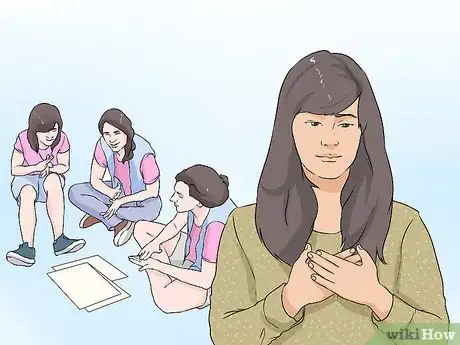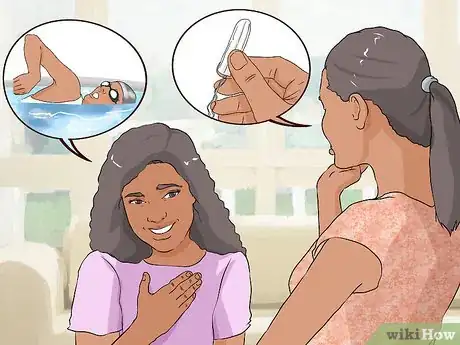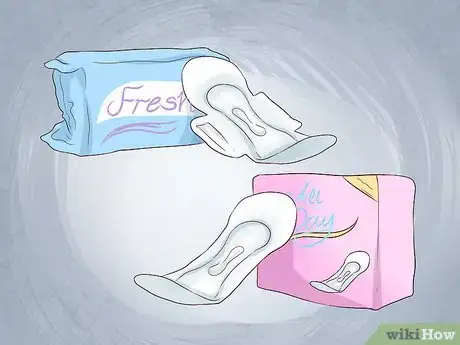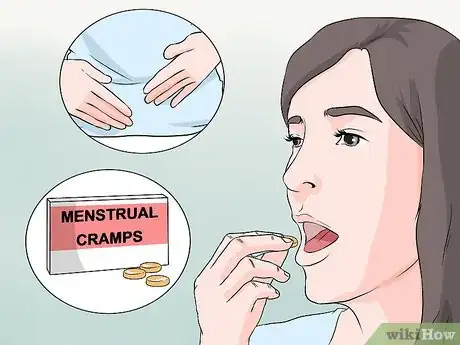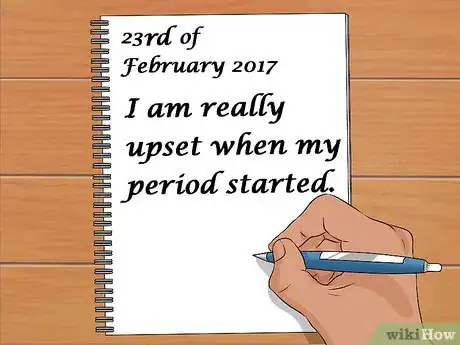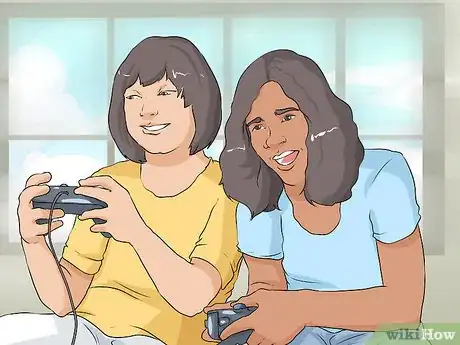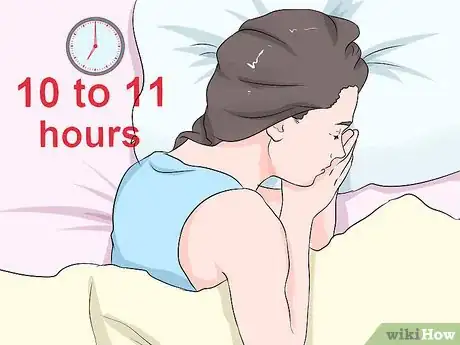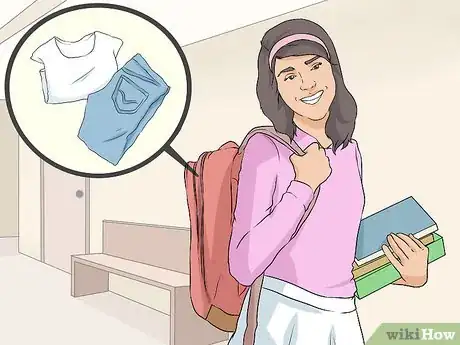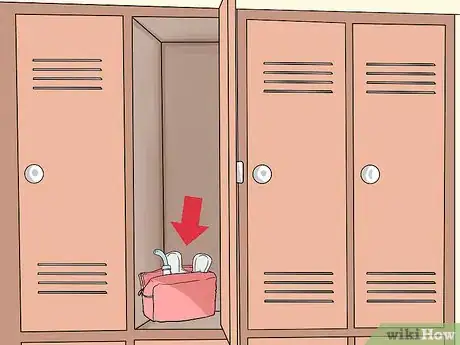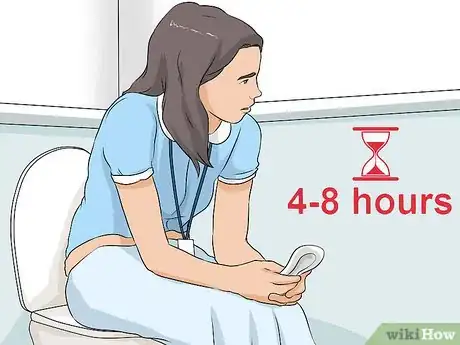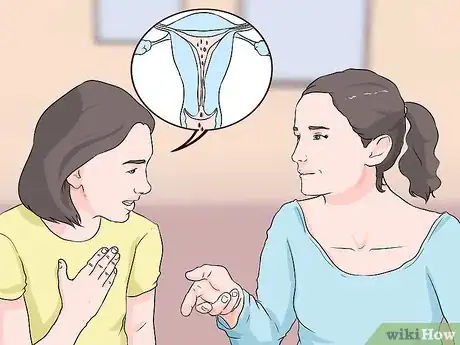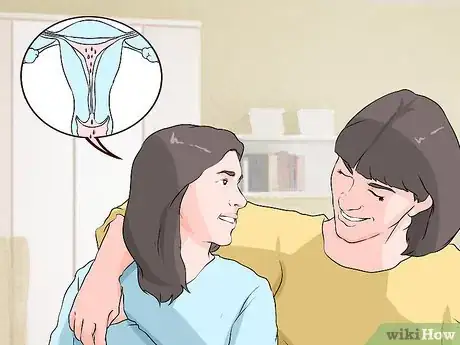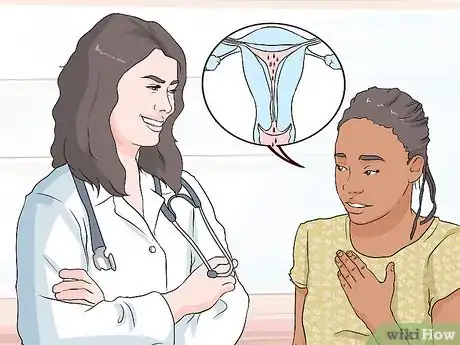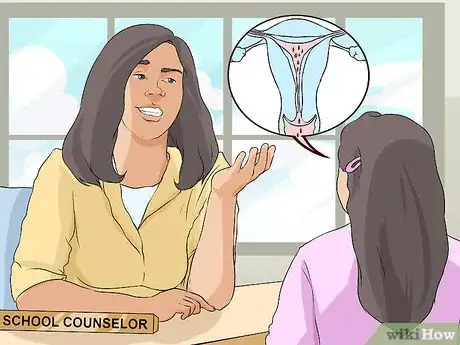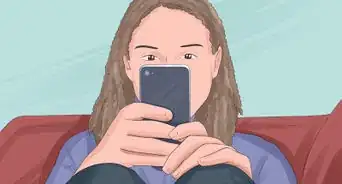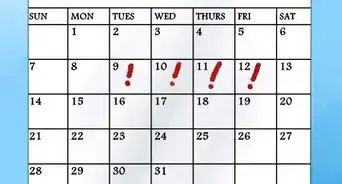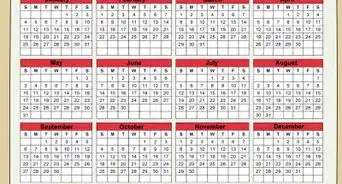This article was co-authored by Rebecca Levy-Gantt, MPT, DO. Dr. Rebecca Levy-Gantt is a board certified Obstetrician and Gynecologist running a private practice based in Napa, California. Dr. Levy-Gantt specializes in menopause, peri-menopause and hormonal management, including bio-Identical and compounded hormone treatments and alternative treatments. She is also a Nationally Certified Menopause Practitioner and is on the national listing of physicians who specialize in menopausal management. She received a Masters of Physical Therapy from Boston University and a Doctor of Osteopathic Medicine (DO) from the New York College of Osteopathic Medicine.
There are 9 references cited in this article, which can be found at the bottom of the page.
wikiHow marks an article as reader-approved once it receives enough positive feedback. This article received 13 testimonials and 83% of readers who voted found it helpful, earning it our reader-approved status.
This article has been viewed 97,109 times.
Most girls start their period between the ages of 12 and 13, but you can start as early as 8 years old. Getting your period early can be difficult and make you feel different from other girls your age. One of the scariest parts is handling your period while you are at school. You will feel much better about your period if you know how to manage it and have the support of adults in your life.
Steps
Dealing with Your Emotional and Physical Symptoms
-
1Accept that you may feel different than your friends. You can get your period at ages 8-16. You normally would get it at ages 11-14. You may be the first one of your friends to start your period, which can put you in a strange situation. You are still the same age as your friends, but you are dealing with some issues that your friends may not understand. Continue to hang out with friends your age and do the things that you have always enjoyed doing with them. You are still a kid.[1] [2]
- If your friends do not understand what you are going through, do not talk with them about your period. Have these conversations with your parents or other female family members. Just talk to your friends about the things you would usually talk about.
- If you are not feeling well because of your period, you can tell your friends that you are sick without going into all of the details.
- This can be really hard at first, but it will become easier once your friends start getting their periods.
-
2Be prepared in any situation. You may not always be at home or at school when your period starts. Knowing what you will do in each situation can make you feel less nervous. Talk to your parent about how to handle your period in different situations.[3]
- What will you do if you start your period at a friend's house?
- What will you do if you want to go swimming?
- What will you do if your period starts, but you do not have a pad or tampon?
Advertisement -
3Consider using pads at first. Many people believe it is best to use pads instead of tampons when you first start your period. Pads are worn outside of your body, and you can stick them in your underwear. A tampon must be inserted inside of your vagina.[4] Pads are much easier to change, and it will be easier for you to tell when it is time to change your pad. Some girls alternate between using pads and tampons.[5]
- Talk to a parent to help you decide which option is best for you.
- You can try both pads and tampons to see which one you are most comfortable with.
- Tampons may be more comfortable for playing sports and going swimming.
-
4Take a pain medicine for cramps if you get them. You may experience cramps before and during your period. These cramps can be painful and distract you from doing your normal activities. If your cramps bother you, ask your parents about taking some pain medication. You will want to take pain medication before you go to school and possibly while you are at school.[6]
- Your parents can help you decide the best dose and timing to take your pain medicine.
- Ask your female family members if they experience cramps. You are more likely to have them if they do.
- Placing a heating pad on your lower abdomen and/or back can also help with cramps.
-
5Write in a journal. You may feel all types of emotions about your period. Are you upset that your period has already started? Do you feel different from your friends now that you have your period?
- All of the emotions you are experiencing are completely normal.
- Writing down how you feel helps you express yourself in a healthy way. Your journal is for your eyes only so you can be honest about how you are really feeling.
-
6Do something fun. Getting your period at an early age makes you feel less like a kid. Although managing your period is a big responsibility, you can still do all of the things you liked to do before. Focus on things that make you happy instead of thinking about your period.
- Watch a funny movie or go outside and play.
- Spend time with your friends and talk about things that are not related to your period.
-
7Get plenty of sleep. Your body is going through a lot of changes right now. You are probably moodier and more irritable, especially when you are on your period. If you are between the ages of 7 and 12, you need 10 to 11 hours of sleep each night.[7] Not getting enough sleep can make you feel worse.[8]
Managing Your Period at School
-
1Bring an extra change of clothes. Accidents are common. Your period may start unexpectedly or you may bleed more heavily than normal. Getting blood on your clothes can be embarrassing and make you feel nervous and uncomfortable. As long as you are prepared, you will be able to handle it.[9]
- Keep a pair of pants and underwear in your locker or backpack. You may also ask your school nurse or guidance counselor to keep your change of clothes in their office.
- You can also keep a shirt or jacket that you can wrap around your waist if you have an accident.
- Also avoid wearing light colored pants and skirts when you are on your period. Accidents are easier to spot on lighter colors.
-
2Carry pads or tampons with you. Always keep pads and/or tampons with you when you are at school. Keep them in a plastic bag and store them in your backpack, locker, or purse. This way you will always be prepared and have your supplies with you.[10]
- If you do not have pads or tampons with you, ask a female teacher or school nurse. They are used to dealing with periods and will be happy to help you.
- Keep these items with you even when you are not on your period.
-
3Change your pad at school. Tampons and/or pads should be changed every 4-8 hours. You may be worried about changing your pad at school and feel like everyone can hear what you are doing in the bathroom.[11] If you are worried about other people hearing you, stop. What you are doing in the bathroom is no one's business but yours. Be brave. Or, avoid going to the bathroom during busy times. If you are in the bathroom with other people, remember that there are a lot of noises going on in there. Changing your pad probably sounds louder to you than it does to everyone else.
- If you need to excuse yourself from class to change your pad, go up to your teacher and say that you need to go to the bathroom for a "girl issue." Your teacher will know what you are talking about.
- There should be a special trashcan in the bathroom stall for you to throw away your pad or tampon. If there is not, wrap up your used pad in tissue paper and throw it away in the trashcan outside of your stall.
- You may also go to the school nurse and ask to use a single stall bathroom.
-
4Consider telling a friend. You may feel all alone or different from your friends when you get your period at an early age. If you feel comfortable, you may want to tell a friend that you can trust. This person can be a source of support for you.
- You do not have to tell your friends that your period has started if you do not want to. This is private information.
- Be careful who you tell. If your friend gossips about other people, this should not be the person you tell. Find a friend that you have shared secrets and personal information with before.
Talking to an Adult
-
1Tell your mother or a female relative. Older women in your family know exactly what you are going through. If you haven't already done so, let them know that you got your period. It may feel awkward to talk about this, but remember this is a normal part of growing up.[12]
- Your female family members care about you and are there to help you through this time in your life. They will have good advice and can help you get all of the period supplies that you need.
- Ask about their experiences of dealing with their period when they were younger.
-
2Talk to your doctor. A health care professional is the best place to ask questions and learn about your period. You might wonder if what you are experiencing is normal. Some girls feel more comfortable talking to a doctor than a family member.
- If you have not started your period, your doctor can give you a physical exam and estimate when you may start.
- Talk about any of your worries or concerns. For example, if your period is erratic (doesn't come regularly), heavy, or causes you pain, it is a good idea to talk this sort of problem through with someone who has answers.
- Make list of questions that you would like to ask and take your list with you to your doctor's appointment. This will help you remember your questions if you get nervous.
-
3Identify an adult at your school that you trust. Your family or doctor will not be with you when you are at school. Think about a female teacher, school nurse, or guidance counselor that you feel comfortable with. This person can be a resource for you if you need some help while you are at school.
- It is important for you to identify this person before you need any help so you will know exactly where to go.
- Your parent could send a note to this person that lets them know that you have started your period and may come to them if you need some assistance while you are at school.
Expert Q&A
-
QuestionWhat to do if periods are not coming properly?
 Rebecca Levy-Gantt, MPT, DODr. Rebecca Levy-Gantt is a board certified Obstetrician and Gynecologist running a private practice based in Napa, California. Dr. Levy-Gantt specializes in menopause, peri-menopause and hormonal management, including bio-Identical and compounded hormone treatments and alternative treatments. She is also a Nationally Certified Menopause Practitioner and is on the national listing of physicians who specialize in menopausal management. She received a Masters of Physical Therapy from Boston University and a Doctor of Osteopathic Medicine (DO) from the New York College of Osteopathic Medicine.
Rebecca Levy-Gantt, MPT, DODr. Rebecca Levy-Gantt is a board certified Obstetrician and Gynecologist running a private practice based in Napa, California. Dr. Levy-Gantt specializes in menopause, peri-menopause and hormonal management, including bio-Identical and compounded hormone treatments and alternative treatments. She is also a Nationally Certified Menopause Practitioner and is on the national listing of physicians who specialize in menopausal management. She received a Masters of Physical Therapy from Boston University and a Doctor of Osteopathic Medicine (DO) from the New York College of Osteopathic Medicine.
Board Certified Obstetrician & Gynecologist The most common reason for your period to be late is pregnancy, but this isn't necessarily the only thing that can cause this to happen. If you've lost or gained a lot of weight recently, this can kind of mess with your ovaries and cause you to skip a period. Another thing that may cause this is a thyroid problem. The thyroid controls your metabolism, and that can impact your period. Either way, it's a good idea to see your OB/GYN to have them take a look. Try not to worry in the mean time, though.
The most common reason for your period to be late is pregnancy, but this isn't necessarily the only thing that can cause this to happen. If you've lost or gained a lot of weight recently, this can kind of mess with your ovaries and cause you to skip a period. Another thing that may cause this is a thyroid problem. The thyroid controls your metabolism, and that can impact your period. Either way, it's a good idea to see your OB/GYN to have them take a look. Try not to worry in the mean time, though.
References
- ↑ http://www.drgreene.com/qa-articles/precocious-puberty/
- ↑ http://parenting.blogs.nytimes.com/2014/10/29/what-to-do-when-your-daughter-gets-her-period-too-young-or-right-on-time/
- ↑ http://parenting.blogs.nytimes.com/2014/10/29/what-to-do-when-your-daughter-gets-her-period-too-young-or-right-on-time/
- ↑ http://kidshealth.org/en/kids/pads-tampons.html?WT.ac=ctg#
- ↑ Rebecca Levy-Gantt, MPT, DO. Board Certified Obstetrician & Gynecologist. Expert Interview. 3 April 2020.
- ↑ http://kidshealth.org/en/kids/period-cramps.html?ref=search#
- ↑ http://www.webmd.com/parenting/guide/sleep-children?page=2
- ↑ https://www.mentalhelp.net/articles/mental-emotional-social-changes-through-puberty/
- ↑ https://kidshealth.org/en/kids/period-school.html
- ↑ Rebecca Levy-Gantt, MPT, DO. Board Certified Obstetrician & Gynecologist. Expert Interview. 3 April 2020.
- ↑ http://kidshealth.org/en/kids/pads-school.html?WT.ac=k-ra#catgirls
- ↑ Rebecca Levy-Gantt, MPT, DO. Board Certified Obstetrician & Gynecologist. Expert Interview. 3 April 2020.
